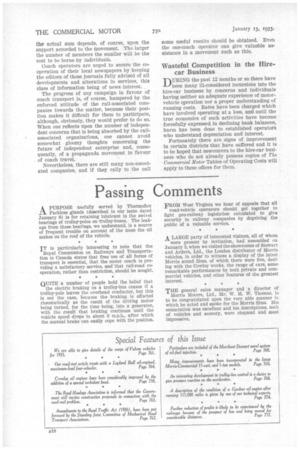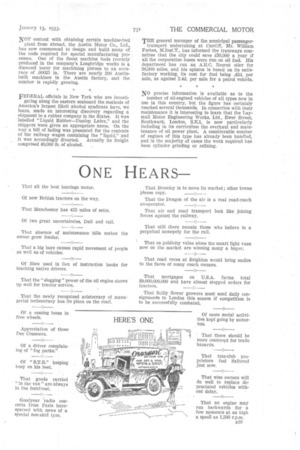Passing Comments
Page 32

Page 33

If you've noticed an error in this article please click here to report it so we can fix it.
APURPOSE usefully served by Thermoflex Packless glands (described in our issue dated January 6) is for retaining lubricant in the swivel bearings of trolley-poles on trolley-buses. The leakage from these bearings, we understand, is a source of frequent trouble on account of the mess the oil makes on the roof of the vehicle.
IT is particularly interesting to note that the Royal Commission on Railways and Transportation in Canada states that free use of all forms of transport is essential, that the motor coach is providing a satisfactory service, and that rail-road cooperation, rather than restriction, should be sought.
•QUITE a number of people hold the belief that the electric braking on a trolley-bus ceases if a trolley-pole leaves the overhead conductor, but this is not the case, because the braking is effected rheostatically as the result of the driving motor being turned, for the time being, into a generator, with the result that braking continues until the vehicle speed drops to about 6 m.p.h., after which the manual brake can easily cope with the position. FROM West Virginia we hear of appeals that all road-vehicle operators should get together to fight pro-railway legislation calculated to give security to railway companies by depriving the public of a valuable service.
A LARGE party of interested visitors, all of whom were present by invitation, had assembled on January 5, when we visited the showrooms of Stewart and Ardern, Ltd., the London distributor of Morris vehicles, in order to witness a display of the latest Morris sound films, of which there were five, dealing with the Cowley works, the range of cars, some remarkable performances by both private and commercial vehicles, and other features of the greatest interest.
THE general sales manager and a director of Morris Motors, Ltd., Mr. W. M. W. Thomas, is to be congratulated upon the very able manner in which he acted and spoke for the Morris films. His enunciation was excellent and his descriptions, both of vehicles and scenery, were eloquent and most impressive. NOT content with obtaining certain machine-tool plant from abroad, the Austin Motor Co., Ltd., has now commenced to design and build many of the tools required for special manufacturing processes. One of the finest machine tools recently produced in the company's Longbridge works is a diamond borer for machining pistons to an accuracy of .00025 in. There are nearly 200 Austinbuilt machines in the Austin factory, and the number is rapidly growing.
FEDERAL officials in New York who are investi gating along the eastern seaboard the methods of America's largest illicit alcohol syndicate have, we learn, made an interesting discovery regarding a shipment to a rubber company in the States. It was labelled "Liquid Rubber—Dunlop Latex," and the shippers were given an appropriate name. On the way a bill of lading was presented for the contents of the railway wagon containing the "liquid," and it was accordingly diverted. Actually its freight comprised 40,000 lb. of alcohol. THE general manager of the municipal passenger transport undertaking at Cardiff, Mr. William Forbes, Minst.T., has informed the tramways committee that the city could save 130,000 a year if all the corporation bases were ran on oil fuel. His department has run an A.E.O. Regent oiler for 36,000 miles, and his opinion is based on its satisfactory working, its cost for fuel being .42d. per mile, as against 2.4d. per mile for a petrol vehicle.
NO precise information is available as to the number of oil-engined vehicles of all types now in use in this country, but the figure has certainly reached several thousands. In connection with their maintenance it is interesting to learn that the Laystall Motor Engineering Works, Ltd., Ewer Street, Southwark, London, S.E.I, is now particularly including in its curriculum the overhaul and maintenance of oil power plant. A considerable number of engines of this type has already been handled, and in the majority of cases the work required has been cylinder grinding or relining.




























































































